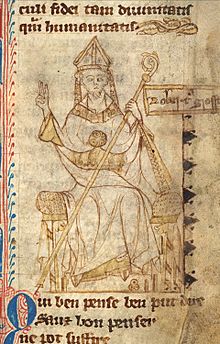
Back روبرت جروسيتيست Arabic روبرت جروسيتيست ARZ Robert Grosseteste Catalan Robert Grosseteste Czech Robert Grosseteste German Roberto Grosseteste Esperanto Roberto Grosseteste Spanish Robert Grosseteste Estonian Robert Grosseteste Basque Robert Grosseteste Finnish
Robert Grosseteste | |
|---|---|
| Bishop of Lincoln | |
 An early 14th-century portrait of Grosseteste[1] | |
| Installed | 1235 |
| Term ended | 1253 |
| Predecessor | Hugh of Wells |
| Successor | Henry of Lexington |
| Personal details | |
| Born | c. 1168–70 |
| Died | 8 or 9 October 1253 (aged about 85) Buckden, Huntingdonshire Philosophy career |
| Era | Medieval philosophy |
| Region | Western philosophy |
| School | Scholasticism |
Main interests | Theology, natural philosophy |
Notable ideas | Theory of scientific demonstration |
|
Preview warning: Page using Template:Infobox philosopher with unknown parameter "influenced" Preview warning: Page using Template:Infobox philosopher with unknown parameter "influences" | |
| Sainthood | |
| Feast day | 9 October |
| Venerated in | Anglican Communion |
Robert Grosseteste[n 1] (/ˈɡroʊstɛst/ GROHS-test; Latin: Robertus Grosseteste; c. 1168-70 – 8 or 9 October 1253),[11] also known as Robert Greathead or Robert of Lincoln, was an English statesman, scholastic philosopher, theologian, scientist and Bishop of Lincoln. He was born of humble parents in Suffolk (according to the early 14th-century chronicler Nicholas Trevet), but the association with the village of Stradbroke is a post-medieval tradition.[12] Upon his death, he was revered as a saint in England, but attempts to procure a formal canonisation failed. A. C. Crombie called him "the real founder of the tradition of scientific thought in medieval Oxford, and in some ways, of the modern English intellectual tradition". As a theologian, however, he contributed to increasing hostility to Jews and Judaism, and spread the accusation that Jews had purposefully suppressed prophetic knowledge of the coming of Christ, through his translation of the Testaments of the Twelve Patriarchs.
- ^ Brev. Hist. Ang. Scot. &c. (Harleian MS 3860, f. 48).
- ^ Richard of Bardney in his work 'The Life of Robert Grosstête' gives Stow as Grosseteste's birthplace, without mentioning Suffolk. R. W. Southern (1986, p. 77) notes that there are three Stows in Suffolk.
- ^ Steven P. Marrone, William of Auvergne and Robert Grosseteste: New Ideas of Truth in Early Thirteenth Century, Princeton University Press, 2014, p. 146.
- ^ Charles Edwin Butterworth, Blake Andrée Kessel (eds.), The Introduction of Arabic Philosophy Into Europe, BRILL, 1994, p. 55.
- ^ Hackett, Jeremiah M.G. (1997), "Roger Bacon: His Life, Career, and Works", Roger Bacon and the Sciences: Commemorative Essays, Studien und Texte zur Geistesgeschichte des Mittelalters, No. 57, Leiden: Brill, p. 10, ISBN 90-04-10015-6
- ^ Edith Wilks Dolnikowski, Thomas Bradwardine: A View of Time and a Vision of Eternity in Fourteenth Century Thought, BRILL, 1995, p. 101 n. 4.
- ^ Tom Sorell (ed.), The Cambridge Companion to Hobbes, Cambridge University Press, 1996, p. 155 n. 93.
- ^ G.M. Miller, BBC Pronouncing Dictionary of British Names (London: Oxford UP, 1971), p. 65.
- ^ "Grosseteste, Robert (1168–1253)", CERL Thesaurus.
- ^ Grosseteste, Robert 1175?–1253", OCLC WorldCat Identities.
- ^ Lewis 2019 has 1168, Southern 2010 has 1170
- ^ Giles E. M. Gasper, et al, Knowing and Speaking: Robert Grosseteste's "De artibus liberalibus" ("On the Liberal Arts") and "De Generatione Sonorum" ("On the Generation of Sounds)" (Oxford University Press, 2019), pp. 9–35 and 199–225.
Cite error: There are <ref group=n> tags on this page, but the references will not show without a {{reflist|group=n}} template (see the help page).